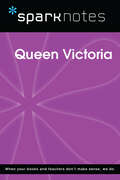- Table View
- List View
Queen Esther: A Novel
by John IrvingAfter forty years, John Irving returns to the world of his bestselling classic novel and Academy Award–winning film, The Cider House Rules, revisiting the orphanage in St. Cloud&’s, Maine, where Dr. Wilbur Larch takes in Esther—a Viennese-born Jew whose life is shaped by anti-Semitism.Esther Nacht is born in Vienna in 1905. Her father dies on board the ship to Portland, Maine; her mother is murdered by anti-Semites in Portland. Dr. Larch knows it won&’t be easy to find a Jewish family to adopt Esther; in fact, he won&’t find any family who&’ll adopt her. When Esther is fourteen, soon to be a ward of the state, Dr. Larch meets the Winslows, a philanthropic New England family with a history of providing foster care for unadopted orphans. The Winslows aren&’t Jewish, but they despise anti-Semitism. Esther&’s gratitude for the Winslows is unending; even as she retraces her roots back to Vienna, she never stops loving and protecting the Winslows. In the final chapter, set in Jerusalem in 1981, Esther Nacht is seventy-six. John Irving&’s sixteenth novel is a testament to his enduring ability to weave complex characters and intricate narratives that challenge and captivate. Queen Esther is not just a story of survival but a profound exploration of identity, belonging, and the enduring impact of history on our personal lives showcasing why Irving remains one of the world&’s most beloved, provocative, and entertaining authors—a storyteller of our time and for all time.
Queen Esther: A novel
by John IrvingAfter forty years, John Irving returns to the world of his bestselling classic novel and Academy Award winner The Cider House Rules, revisiting the orphanage in St. Cloud's, Maine, where Dr. Larch takes in Esther, a three-year-old Jew whose life is shaped by anti-Semitism.Esther Nacht is born in Vienna in 1905. Her father dies on board a ship from Bremerhaven to Portland, Maine, and anti-Semites murder her mother in Portland. In St. Cloud&’s, it&’s clear to Dr. Larch, the orphanage physician and director, that the abandoned child not only knows she&’s Jewish, but she&’s familiar with the biblical Queen Esther she was named for. Dr. Larch knows it won&’t be easy to find a Jewish family to adopt Esther, he doubts he'll find any family to adopt her.When Esther is fourteen, soon to become a ward of the state, Dr. Larch meets the Winslows, a philanthropic family with a history of providing for unadopted orphans. The Winslows aren&’t Jewish, but they detest anti-Semitism and similar prejudice. Esther&’s gratitude to the Winslows is unending. As she retraces her steps to her birth city, Esther keeps loving and protecting the Winslows—even in Vienna.The final chapter of this historical novel is set in Jerusalem in 1981, when Esther is seventy-six.
Queen Margaret of Sicily
by Jacqueline AlioMargaret of Navarre (1135-1183) stands out as Sicily's greatest medieval queen. As her son's regent for five years, she was the most powerful woman in Europe, ruling a multicultural kingdom of Christians, Muslims and Jews. Her life and times make for the compelling story of a wife, sister, mother and leader. Based on original medieval records consulted during research in Italy and Spain, this is the first biography ever written about Queen Margaret. This abridged edition includes the narrative text of the 512-page print edition of 2017 but without the endnotes. Two of the ten appendices, and most of the maps, are included, along with the genealogical tables and an outline of the bibliography. This book is an excellent introduction to a woman about whom virtually nothing was written until recently.
Queen Mary
by James Pope-HennessyThe official biography of Queen Mary, grandmother of the current Queen, originally commissioned in 1959 - with a new foreword by Hugo Vickers.When Queen Mary died in 1953, James Pope-Hennessy was commissioned to write an official biography of her - unusual for a Queen Consort. Queen Mary's life, contrary to popular belief, was essentially dramatic, and she played a far more important and influential role in the affairs of the British monarchy than her public image might have otherwise suggested. Using material from the Royal Archives, private papers and Queen Mary's personal diaries and letters, Pope-Hennessy's biography was a remarkable portrait of a remarkable woman and received rave reviews across the press. Long out of print, this new edition of Queen Mary will be accompanied by a new foreword from royal biographer and writer Hugo Vickers.
Queen Mary
by James Pope-HennessyThe official biography of Queen Mary, grandmother of the current Queen, originally commissioned in 1959 - with a new foreword by Hugo Vickers.When Queen Mary died in 1953, James Pope-Hennessy was commissioned to write an official biography of her - unusual for a Queen Consort. Queen Mary's life, contrary to popular belief, was essentially dramatic, and she played a far more important and influential role in the affairs of the British monarchy than her public image might have otherwise suggested. Using material from the Royal Archives, private papers and Queen Mary's personal diaries and letters, Pope-Hennessy's biography was a remarkable portrait of a remarkable woman and received rave reviews across the press. Long out of print, this new edition of Queen Mary will be accompanied by a new foreword from royal biographer and writer Hugo Vickers.(P) 2020 Hodder & Stoughton Ltd
Queen Mary (Phoenix Press Ser.)
by James Pope-HennessyThe official biography of Queen Mary, grandmother of the current Queen, originally commissioned in 1959 - with a new foreword by Hugo Vickers.When Queen Mary died in 1953, James Pope-Hennessy was commissioned to write an official biography of her - unusual for a Queen Consort. Queen Mary's life, contrary to popular belief, was essentially dramatic, and she played a far more important and influential role in the affairs of the British monarchy than her public image might have otherwise suggested. Using material from the Royal Archives, private papers and Queen Mary's personal diaries and letters, Pope-Hennessy's biography was a remarkable portrait of a remarkable woman and received rave reviews across the press. Long out of print, this new edition of Queen Mary will be accompanied by a new foreword from royal biographer and writer Hugo Vickers.
Queen Mother
by Anthony HoldenBy the author of Their Royal Highnesses, Charles, Prince of Wales and Olivier, this is a biography of the Queen Mother.
Queen Mother
by Anthony HoldenBy the author of Their Royal Highnesses, Charles, Prince of Wales and Olivier, this is a biography of the Queen Mother.
Queen Song (Red Queen Novella #1)
by Victoria AveyardIn this 55-page prequel novella set in the Red Queen world, Queen Coriane, first wife of King Tiberias, keeps a secret diary--how else can she ensure that no one at the palace will use her thoughts against her? Coriane recounts her heady courtship with the crown prince, the birth of a new prince, Cal, and the potentially deadly challenges that lay ahead for her in royal life.
Queen Victoria
by Cecil Woodham-SmithNot only a biography, this book places Victoria in full historical context, making vivid the great political events and figures of the Victorian era.
Queen Victoria
by Elizabeth LongfordDrawing upon Queen Victoria's previously unpublished journals, Elizabeth Longford's classic biography recalls the contrasts and curiosities of an earlier era with exquisite detail - and transforms the queen from a severe, time-worn effigy into a human being who loved, feared and fumed. Longford probes the contradictions of a woman who wore a bonnet instead of a crown at her Golden Jubilee and yet was recognised always as both dignified and formidable. She chronicles both the Queen's public life and her emotional travails, including surprisingly stormy passages in her and Prince Albert's otherwise loving marriage. A refreshingly human image of the Queen emerges: voluble, passionate, politic and articulate, with an irresistible mixture of grandeur and simplicity.
Queen Victoria
by Lytton StracheyGiles Lytton Strachey (1880-1932) was a British writer and critic. He is best known for establishing a new form of biography in which psychological insight and sympathy are combined with irreverence and wit. From time to time throughout his life Strachey studied Italian, German, and French. Landmarks in French Literature was published in 1912. By 1916 Strachey's theory of biography was fully developed and mature. He was being greatly influenced by Dostoevsky. His first great success, and his most famous achievement, was Eminent Victorians (1918), a collection of four short biographies of Victorian heroes. This work was followed in the same style by Queen Victoria (1921). Amongst his other works are Books and Characters: French and English (1922), Elizabeth and Essex: A Tragic History (1928), Portraits in Miniature (1931) and Characters and Commentaries (1933).
Queen Victoria (SparkNotes Biography Guide)
by SparkNotesQueen Victoria (SparkNotes Biography Guide) Making the reading experience fun! SparkNotes Biography Guides examine the lives of historical luminaries, from Alexander the Great to Virginia Woolf. Each biography guide includes:An examination of the historical context in which the person lived A summary of the person&’s life and achievements A glossary of important terms, people, and events An in-depth look at the key epochs in the person&’s career Study questions and essay topics A review test Suggestions for further reading Whether you&’re a student of history or just a student cramming for a history exam, SparkNotes Biography guides are a reliable, thorough, and readable resource.
Queen Victoria After Albert: Her Life and Loves
by Ilana D. MillerFew British monarchs have fit the time, the tone or the energy of an era quite the way Queen Victoria mastered her reign. From her ascension to the throne in 1837 to her death in 1901, her monarchy was one of spectacular advances in the British Empire. Political, scientific, and industrial wonders were changing the world. Britain's influence reached all corners of the earth. But there was one area that particularly intrigued the Queen. Men. Keenly aware of the opposite sex, her most trusted advisors were men. Lord Melbourne, her first prime minister, was an avuncular presence. Then her beloved husband Prince Albert took the reins until his death in 1861. In a widowhood of forty years, her ministers were a varied lot. She adored Disraeli, disliked Gladstone, and found genuine friendship with Lord Salisbury. Then there was Mr. Brown, the Scottish ghillie who she found wonderfully attractive. Later there was Abdul Karim, the Munshi, or teacher with whom she had a motherly relationship. She adored her son-in-law, Prince Henry of Battenberg, the 'sunshine of their lives' and was devastated when he died. She also loved her grandson-in-law, Prince Louis Battenberg, who was one of the executors of her will. Those years without Albert were not barren loveless years, they were not without happiness and pleasure, even if the queen herself might protest.
Queen Victoria and Her Prime Ministers: Her Life, the Imperial Ideal, and the Politics and Turmoil That Shaped Her Extraordinary Reign
by Anne SomersetA riveting portrait of Queen Victoria and the ten prime ministers who headed British government during her sixty-three-year reignIt is generally accepted that Queen Victoria reigned but did not rule. This couldn&’t be more wrong. A passionate and opinionated leader, Victoria was born to govern with no room for doubt about her historic destiny or the might of the empire that was built in her name. When it came to her involvement in state affairs, Victoria herself acknowledged that she had held strong &“likes and dislikes&” for the various prime ministers who served throughout her political evolution from headstrong teenager to seasoned leader.Anne Somerset&’s Queen Victoria and Her Prime Ministers charts the feuds and affectionate interactions Victoria had with her ten premiers in often hilarious detail, from her adoration of Benjamin Disraeli, her favorite prime minister who filled her life with &“poetry, romance, and chivalry,&” to her detestation for William Gladstone, a man she deemed a &“dangerous old fanatic.&” Drawing extensively on unpublished sources such as material from the Royal Archives and never-before-seen prime ministerial papers, Somerset casts a fresh and highly illuminating perspective not just on Victoria, but on the exceptional politicians who served her in a time of massive global change.
Queen Victoria's Children
by John KisteQueen Victoria and Albert, Prince Consort had nine children who despite their very different characters, remained a close-knit family. Inevitably, as they married into European royal families their loyalties were divided and their lives dominated by political controversy. This is not only the story of their lives in terms of world impact, but also of their own personal achievements, their individual contributions to public life in Britain and overseas and in their roles as the children of Queen Victoria and the Prince Consort.
Queen Victoria's Little Wars
by Byron FarwellThis book is a lively overview with many historical anecdotes of British colonial wars and confrontations with people who fought them, from 1837 to 1901, to protect British Interest in Asia, Canada, Africa and Arabia.
Queen Victoria's Matchmaking: The Royal Marriages that Shaped Europe
by Deborah CadburyA captivating exploration of the role in which Queen Victoria exerted the most international power and influence: as a matchmaking grandmother.As her reign approached its sixth decade, Queen Victoria's grandchildren numbered over thirty, and to maintain and increase British royal power, she was determined to maneuver them into a series of dynastic marriages with the royal houses of Europe.Yet for all their apparent obedience, her grandchildren often had plans of their own, fueled by strong wills and romantic hearts. Victoria's matchmaking plans were further complicated by the tumultuous international upheavals of the time: revolution and war were in the air, and kings and queens, princes and princesses were vulnerable targets.Queen Victoria's Matchmaking travels through the glittering, decadent palaces of Europe from London to Saint Petersburg, weaving in scandals, political machinations and family tensions to enthralling effect. It is at once an intimate portrait of a royal family and an examination of the conflict caused by the marriages the Queen arranged. At the heart of it all is Victoria herself: doting grandmother one moment, determined Queen Empress the next.
Queen Victoria's Mysterious Daughter: A Biography of Princess Louise
by Lucinda HawksleyThe secrets of Queen Victoria's sixth child, Princess Louise, may be destined to remain hidden forever. What was so dangerous about this artistic, tempestuous royal that her life has been documented more by rumor and gossip than hard facts? When Lucinda Hawksley started to investigate, often thwarted by inexplicable secrecy, she discovered a fascinating woman, modern before her time, whose story has been shielded for years from public view.Louise was a sculptor and painter, friend to the Pre-Raphaelites and a keen member of the Aesthetic movement. The most feisty of the Victorian princesses, she kicked against her mother's controlling nature and remained fiercely loyal to her brothers-especially the sickly Leopold and the much-maligned Bertie. She sought out other unconventional women, including Josephine Butler and George Eliot, and campaigned for education and health reform and for the rights of women. She battled with her indomitable mother for permission to practice the "masculine" art of sculpture and go to art college-and in doing so became the first British princess to attend a public school.The rumors of Louise's colorful love life persist even today, with hints of love affairs dating as far back as her teenage years, and notable scandals included entanglements with her sculpting tutor Joseph Edgar Boehm and possibly even her sister Princess Beatrice's handsome husband, Liko. True to rebellious form, she refused all royal suitors and became the first member of the royal family, since the sixteenth century, to marry a commoner. She moved with him to Canada when he was appointed Governor-General.Spirited and lively, Queen Victoria's Mysterious Daughter is richly packed with arguments, intrigues, scandals, and secrets, and is a vivid portrait of a princess desperate to escape her inheritance.
Queen Victoria's Secrets
by Adrienne Auslander MunichDrawing upon feminist, anthropological, and postcolonial approaches, Munich searches out the myriad, often contradictory incarnations of Queen Victoria in the minds of her subjects.
Queen Victoria: A Life of Contradictions
by Matthew DennisonQueen Victoria is Britain's queen of contradictions. In her combination of deep sentimentality and bombast; cultural imperialism and imperial compassion; fear of intellectualism and excitement at technology; romanticism and prudishness, she became a spirit of the age to which she gave her name.Victoria embraced photography, railway travel and modern art; she resisted compulsory education for the working classes, recommended for a leading women's rights campaigner ‘a good whipping' and detested smoking. She may or may not have been amused.Meanwhile she reinvented the monarchy and wrestled with personal reinvention. She lived in the shadow of her mother and then under the tutelage of her husband; finally she embraced self-reliance during her long widowhood. Fresh, witty and accessible, Matthew Dennison's Queen Victoria is a compelling assessment of Victoria's mercurial character and impact, written with the irony, flourish and insight that this Queen and her rule so richly deserve.
Queen Victoria: Daughter, Wife, Mother, Widow
by Lucy WorsleyThe story of the queen who defied convention and defined an era A passionate princess, an astute and clever queen, and a cunning widow, Victoria played many roles throughout her life. In Queen Victoria: Twenty-Four Days That Changed Her Life, Lucy Worsley introduces her as a woman leading a truly extraordinary life in a unique time period. Queen Victoria simultaneously managed to define a socially conservative vision of Victorian womanhood, while also defying its conventions. Beneath her exterior image of traditional daughter, wife, and widow, she was a strong-willed and masterful politician. Drawing from the vast collection of Victoria’s correspondence and the rich documentation of her life, Worsley recreates twenty-four of the most important days in Victoria's life. Each day gives a glimpse into the identity of this powerful, difficult queen and the contradictions that defined her. Queen Victoria is an intimate introduction to one of Britain’s most iconic rulers as a wife and widow, mother and matriarch, and above all, a woman of her time.
Queen Victoria: Daughter, Wife, Mother, Widow
by Lucy WorsleyThe audiobook contains an exclusive bonus interview with author Lucy Worsley. Bestselling author and historian Lucy Worsley tracks a new course through Queen Victoria's life, examining how she transformed from dancing princess to the Widow of Windsor and became one of Britain's greatest monarchs along the way. Taking twenty-four significant days from Victoria's life, from her birth, her wedding, her coronation to her husband's death, and many more in between, allows us to see Victoria up close and personal, examining how she lived hour to hour. Published to coincide with the 200th anniversary of Queen Victoria's birth, this major new biography celebrates Queen Victoria as a woman of her time, who lived an extraordinary life.(P)2018 Hodder & Stoughton Limited
Queen Victoria: Daughter, Wife, Mother, Widow
by Lucy Worsley'A wonderfully fresh, vivid and engaging portrait.' Jane Ridley, author of Bertie: A Life of Edward VII'Has much of the abundant charm of its author.' Spectator'The glory of this book is in the details.' The Times'Worsley's command of the material and elegant writing style make this a must-read.' Publisher's Weekly'An intimate glimpse.' Daily Mail 'An engaging portrait of the monarch.' i paper'Provides a unique insight into this inscrutable monarch.' Choice Magazine 'In this lively, light-footed biography, just out in paperback, the popular TV historian Lucy Worsley looks at just 24 days of Victoria's 81-year long life to reveal unexpected sides to the monarch.' BBC History Magazine*******************************Who was Queen Victoria? A little old lady, potato-like in appearance, dressed in everlasting black? She was also a passionate young princess who loved dancing. And there is also a third Victoria, the brilliant queen, one who invented a new role for the monarchy. Victoria found a way of ruling when people were deeply uncomfortable with having a woman on the throne. Her image as a conventional daughter, wife and widow concealed the reality of a talented, instinctive politician. Her actions, if not her words, reveal that she was tearing up the rules on how to be female. But the price of this was deep personal pain.By looking in detail at twenty-four days of her life, through diaries, letters and more, we meet Queen Victoria up-close and personal. Living with her from hour to hour, we can see and celebrate the contradictions that make up British history's most recognisable woman.
Queen Victoria: Essential Biographies
by Elizabeth LongfordQueen Victoria is the longest-reigning monarch in British history. In this concise biography, Lady Longford, long recognised as an authority on the subject, gives a full account of Queen Victoria's life and provides her unique assessment of the monarch. David Cannandine hailed her Victoria RI as 'pre-eminent in the genre...the commissed biography that the great Queen never got'. Victoria ascended the throne in 1837 on the death of her uncle William IV. In 1840, she married her first cousin, Prince Albert of Saxe-Coburg-Gotha, and for the next twenty years they were inseperable. Their descendants were to succeed to most of the thrones of Europe. When Albert died in 1861, Victoria's overwhelming grief meant that she virtually withdrew from public life. This perceived dereliction of her duty, coupled with rumours about her relationship with her Scottish ghillie John Brown, led to increasing criticism. Coaxed back into the public eye by Disraeli, she resumed her former enthusiasm for political and constitutional matters with vigour until her death in 1901.






















